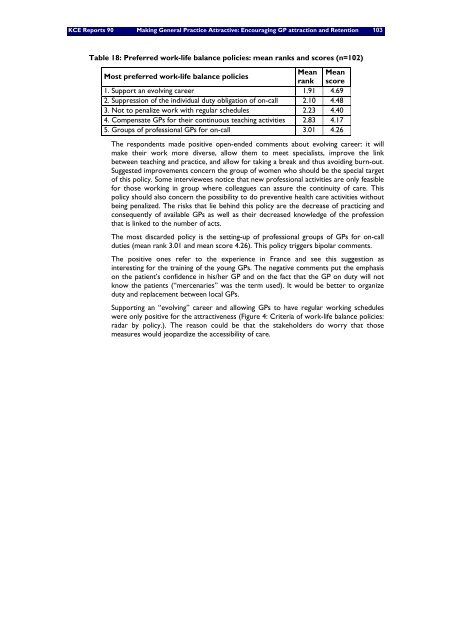Download the report (150 p.) - KCE
Download the report (150 p.) - KCE
Download the report (150 p.) - KCE
You also want an ePaper? Increase the reach of your titles
YUMPU automatically turns print PDFs into web optimized ePapers that Google loves.
<strong>KCE</strong> Reports 90 Making General Practice Attractive: Encouraging GP attraction and Retention 103<br />
Table 18: Preferred work-life balance policies: mean ranks and scores (n=102)<br />
Most preferred work-life balance policies<br />
Mean Mean<br />
rank score<br />
1. Support an evolving career 1.91 4.69<br />
2. Suppression of <strong>the</strong> individual duty obligation of on-call 2.10 4.48<br />
3. Not to penalize work with regular schedules 2.23 4.40<br />
4. Compensate GPs for <strong>the</strong>ir continuous teaching activities 2.83 4.17<br />
5. Groups of professional GPs for on-call 3.01 4.26<br />
The respondents made positive open-ended comments about evolving career: it will<br />
make <strong>the</strong>ir work more diverse, allow <strong>the</strong>m to meet specialists, improve <strong>the</strong> link<br />
between teaching and practice, and allow for taking a break and thus avoiding burn-out.<br />
Suggested improvements concern <strong>the</strong> group of women who should be <strong>the</strong> special target<br />
of this policy. Some interviewees notice that new professional activities are only feasible<br />
for those working in group where colleagues can assure <strong>the</strong> continuity of care. This<br />
policy should also concern <strong>the</strong> possibility to do preventive health care activities without<br />
being penalized. The risks that lie behind this policy are <strong>the</strong> decrease of practicing and<br />
consequently of available GPs as well as <strong>the</strong>ir decreased knowledge of <strong>the</strong> profession<br />
that is linked to <strong>the</strong> number of acts.<br />
The most discarded policy is <strong>the</strong> setting-up of professional groups of GPs for on-call<br />
duties (mean rank 3.01 and mean score 4.26). This policy triggers bipolar comments.<br />
The positive ones refer to <strong>the</strong> experience in France and see this suggestion as<br />
interesting for <strong>the</strong> training of <strong>the</strong> young GPs. The negative comments put <strong>the</strong> emphasis<br />
on <strong>the</strong> patient’s confidence in his/her GP and on <strong>the</strong> fact that <strong>the</strong> GP on duty will not<br />
know <strong>the</strong> patients (“mercenaries” was <strong>the</strong> term used). It would be better to organize<br />
duty and replacement between local GPs.<br />
Supporting an “evolving” career and allowing GPs to have regular working schedules<br />
were only positive for <strong>the</strong> attractiveness (Figure 4: Criteria of work-life balance policies:<br />
radar by policy.). The reason could be that <strong>the</strong> stakeholders do worry that those<br />
measures would jeopardize <strong>the</strong> accessibility of care.
















